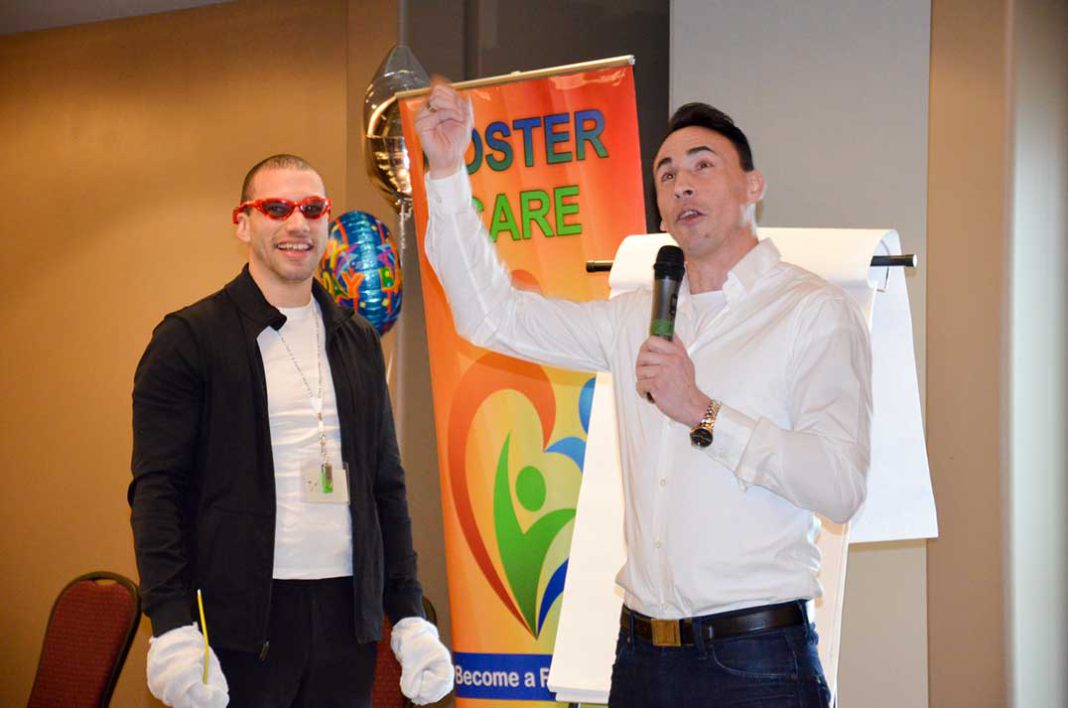LITTLE CURRENT—Nobody gets up in the morning and decides to drink alcohol to condemn their unborn child with the challenges of living with Fetal Alcohol Spectrum Disorder (FASD). For Myles Himmelreich, of Calgary, that perspective has helped him to come to terms with the mother who gave him up for adoption.
Meeting Mr. Himmelreich before his keynote presentation at the Kina Gbezhgomi Child and Family Services Foster Parent Conference, he presents as an animated and engaging young man who really ‘knows his stuff.’
As the caregivers and professionals at the conference soon learn, that presentation is the result of an innovative and clever set of coping strategies that have helped him overcome a series of daunting challenges, any one of which could condemn a less determined individual to a life on society’s fringes.
Mr. Himmelreich delivered an insight into his experiences, including both challenges and successes that he has faced on his life’s journey with FASD, from the unique perspective of someone who has FASD. He has spoken to national and international audiences, motivating and captivating them with his personal journey.
From the moment he began speaking, the veteran FASD presenter had the audience deeply enthralled. For those used to dealing with children with FASD, typically a series of “I don’t knows” alternated with shrugs, Mr. Himmelreich’s entire presentation shone brightly as a beacon of hope.
Through the senses of the presenter the audience joined in Mr. Himmelreich’s experiences and watched life unfold from his perspective.
The sense of barely bridled energy evident in his demeanor is just that, barely bridled. “I have bubbles flowing through my body,” he explained. The sensory input that assaults every waking moment of his daily life. On his finger is a multi-part ring, the centre of which spins around freely. As he speaks, unnoticed by his listeners until pointed out, he twirls the ring around, an activity that drowns out the distraction of the bubbles, allowing him to focus his attention on what he is doing.
One of the participants at the conference volunteers to learn what his learning experience in school was like. First, the volunteer dons a wide set of gloves, then is handed a rubber pencil that flops about in his hand. Then the volunteer dons a red visor whose brim is festooned with bright dancing lights. Ready for action, the volunteer is given his instructions. “Write your first name and keep writing until I tell you to stop,” said Mr. Himmelreich. Meanwhile, the rest of the room is instructed to pick up the noisemakers on their tables and to blow bubbles with the supplied soap and water.
“Now write your first and last name and continue until I tell you to stop,” instructs Mr. Himmelreich. The volunteer is dutifully attempting to follow his instructions.
There were three sets of instructions given to the volunteer during the demonstration. The third, “write down two plus two and solve the equation,” delivered in a calm voice in the midst of the bubbles, bells and continued patter of the presenter was missed, not only by the volunteer, but the vast bulk of the audience as well, including this writer. It was an enlightening experience for everyone.
He made a brief attempt to stand still for a moment in front of the audience. Despite his clear efforts, there was always some part of him on the move through those few moments.
Mr. Himmelreich was adopted by a loving family when he was two-years-old, after transiting seven foster homes, and was integrated into their lives—because of his hearing issues, they changed his name to Myles (his original choices, influenced by the Saturday morning cartoons, were He-man and Smiles). These most remarkable people supported and tried to help him throughout his life, but by the time Mr. Himmelreich was a teenager, he had given up on fitting into the mainstream world.
His most memorable time as a child was the day he was sent home from school and did not received the lecture that by this time had simply become “blah, blah, blah,” a meaningless stream of words that he could not relate too.
But he found friends one summer on the basketball court. He entered into a world where all he needed was a bag of weed and a case of beer to be accepted. He was thrown out of school and had to leave his adoptive family because of the impact of his drug and alcohol abuse on the other siblings.
A humorous moment in the presentation illustrated his ongoing challenges, even as a budding criminal. Able to fit through the window of houses he and his new friends planned to burgle, Mr. Himmelreich would find himself distracted from his mission of theft by the things he found in the house. His YouTube video of a balaclava adorned younger self playing with stuffed birds and singing “in the jungle, the mighty jungle” in someone’s living room deftly illustrated the absurd juxtaposition of his criminal intent and childlike viewpoint.
The secrets to Mr. Himmelreich’s success in coping were laid bare for the audience. He is obviously an intelligent individual, but he learns differently than others. “Repetition, repetition, repetition,” was the secret to his learning. He had been somewhat successful in junior school, when he had the time and opportunity to go over things repeatedly, but when thrust into the general population in the upper grades, that opportunity evaporated.
Later in life, as an adult, he could easily “get the job,” he explained, but then he would soon lose it. He found some success as a youth coach and it was while thus employed that he was asked to present at his first conference.
“I started out reading every word I had written down on the paper,” he recalled, but soon set the paper aside and simply began to talk. So captivating and enlightening were the words that poured out of him, Mr. Himmelreich soon found himself travelling the world, teaching and lecturing across the globe.
Those in attendance who heard the remarkable story of his life stood in ovation at the end of Mr. Himmelreich’s presentation. Through his story, he opened the eyes of his audience to what FASD is, how it impacts on people’s lives, both those with the disorder and those who care for them, in a way that no social worker, psychologist or doctor could.
Mr. Himmelreich may be afflicted with the challenges of FASD, but he is nobody’s victim. During his hour-and-a-half morning presentation, he proved himself to be a consummate storyteller and one of the most effective motivational speakers to grace an Island stage.
Those wishing to learn more about Mr. Himmelreich and his journey can find him online at his website myleshimmelreich.com or by searching YouTube for Myles Himmelreich and watching his presentations.




